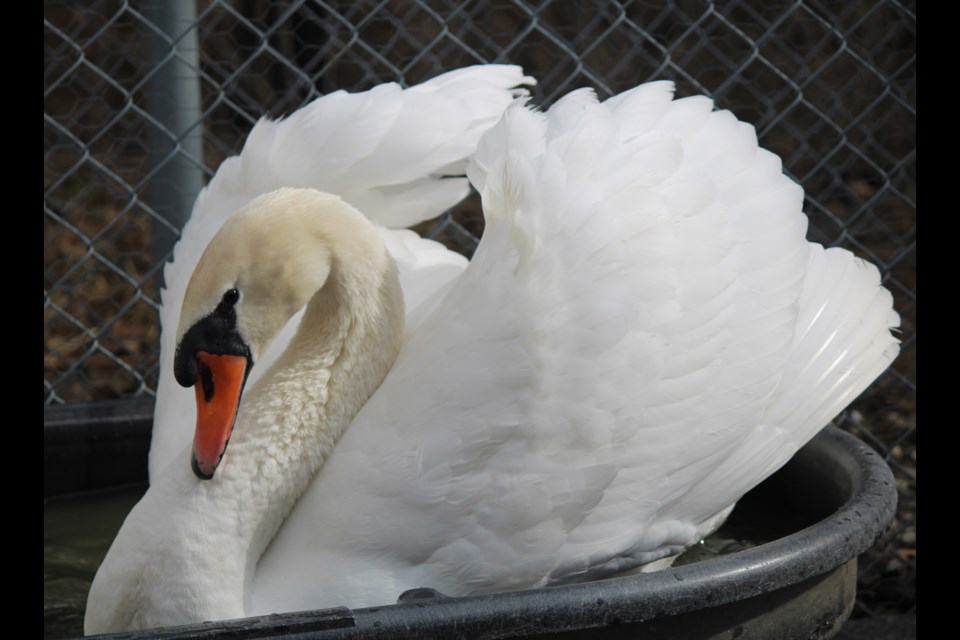ELORA – With springtime upon us, mute swans will be seen on local waterways, but they’re not native to the area.
They’re put there by the Elora Swan Program, who introduced them into the area over 30 years ago.
During the winter, the swans can be seen at a fenced-off compound behind Elora’s LCBO in O’Brien Park but volunteer co-coordinator Brian Gibbon said they’re almost ready to hit the water.
Gibbon and Pam Hasson, the other co-coordinator, weren’t positive of the history behind the program, but Hasson believed it might have been started as a way to replicate a similar initiative from Stratford, but on a smaller scale. Gibbon first started volunteering 12 years ago and Hasson around 20 but both are more recent to being coordinators.
“It’s just, I guess you could say, an enhancement of the water,” Gibbon said on the program’s purpose.
They are part of a group of dedicated volunteers who look after them daily and year-round at the enclosure during the colder months.
“Everyday somebody’s designated to come into the compound to change out their water, put fresh stuff in and make sure there’s enough feed in their pails,” Gibbon said but added they’re quite happy to be outside even in the cold.
The swans are fairly large and can be territorial. Gibbon said he's been bit or pecked a few times. Hasson said they get used to the volunteers and start to recognize people.
“There’s no issue to go in to feed them and the people who look after them get quite attached to them, so they have a bond with them,” Hasson said.
Gibbon said the swans have somewhat distinct personalities to them too. For example, male pair Jupiter and Acadia are very feisty and come right up to the fence, hitting it with their wings and beaks.
“He’s a little raunchy, don’t turn your back on him,” Gibbon said of Jupiter and Acadia. The other swans are an unnamed male and female mated pair: Will and Doug, and Peggy who is now a widow after her mate Cliff died earlier this year. Swans mate for life, at least more or less Gibbon said, so he’s unsure if Peggy will take to a new mate if they can find one.
Gibbon said they’re getting antsy to get out on the water and “do their thing,” which is mate in the case of the male and female pair.
They’ll get there soon, some of them as soon as the upcoming weekend after they get some shots. They'll go to the Grand River in Elora, the Wellington Terrace long-term care home in Aboyne, Millage Pond in Fergus and the Irvine River in Salem.
Gibbon said they most often will mate when out on the waters and not in the enclosure although it has happened on a rare occasion. Mating season begins for mute swans around spring and egg clutch sizes can be as high as 10 but tend to get smaller over their lifespan, which Gibbon said could be up to 20 years.
The survival rate of their cygnets, the name for baby swans, is unfortunately pretty low according to Gibbon.
“When you put them out, they’re out in the wild,” Gibbon said. “People get really upset when it happens but there’s not really a lot you can do about it.”
When they’re out in the wild, volunteers do stop by their usual spots to check-in on them, feed them and make sure they haven’t wandered off too far. Gibbon recalled on occasion having to go down into the Elora Gorge to grab swans that have gone over the dam. Others have disappeared altogether in the past too.
Feeding them also prepares them for when they inevitably have to return to their shelter for the winter.
“Even though they can eat the water plants and whatnot, if you put out a bit of corn for them it just makes a regular routine so they’re used to coming up the banks and eating the corn,” Hasson said.
“When it comes time to round them up for the fall, they’re already coming up on the banks and then it makes it easier for us to catch them. You don’t have much luck trying to catch them out on the water, they’re a lot faster than we are.”
The organization is strictly volunteer-run and relies on donations to operate. Its usual black dress event used to fundraise has been cancelled for the past two years and the organizer of that has moved on.
This is slightly problematic, as Gibbon explained the enclosure is up for major renovation work to the electrical system which is important to keep the water from freezing.
But the co-coordinators are positive they’ll find the money elsewhere and continue to do what they do for the swans and the community.
“They certainly add beauty to the waterways, people see Canada geese and ducks and they’re kind of cute but a swan is really majestic,” Hasson said.
“Everybody likes to see animals in their natural environment and particularly beautiful and I think that’s what they bring to the area.”



